Getting Around Lazy Thinking – Tips for the palm oil sector
As someone who has worked for the palm oil industry during exciting and challenging times, I must say it remains a dynamic one. However, it has continued to attract global attention for the wrong reasons.
 The onslaught of the digital media landscape has supplied a plethora of information about this significant vegetable oil, but also provided detractors with fertile ground to spread disinformation. Unverified or bogus scientific information is rife on the Internet and social media networks. When disinformation is posted or shared, it rapidly spreads to thousands.
The onslaught of the digital media landscape has supplied a plethora of information about this significant vegetable oil, but also provided detractors with fertile ground to spread disinformation. Unverified or bogus scientific information is rife on the Internet and social media networks. When disinformation is posted or shared, it rapidly spreads to thousands.
Misinformation can be defined as any type of information that is disseminated without the intention to mislead (Figure 1). Disinformation, however, refers to the intentional spread of false information, for example driven by political strategies (Michael Hameleers, Thomas E. Powell, Toni G.L.A. Van Der Meer & Lieke Bos, 2020).
The Covid-19 pandemic has been accompanied by a wave of disinformation which has not only undermined policy responses at official levels, but has amplified levels of distrust and concern among citizens. Conspiracy theories about the origin of the virus, fake remedies and misleading healthcare information have all clouded public debate says the OCED; it attributes 88% of this situation to exchanges via social media platforms.
Transparent, timely and reliable information is an essential resource to empower citizens in the midst of the pandemic. For now, governments have emerged as the most trusted source of information (Figure 2).
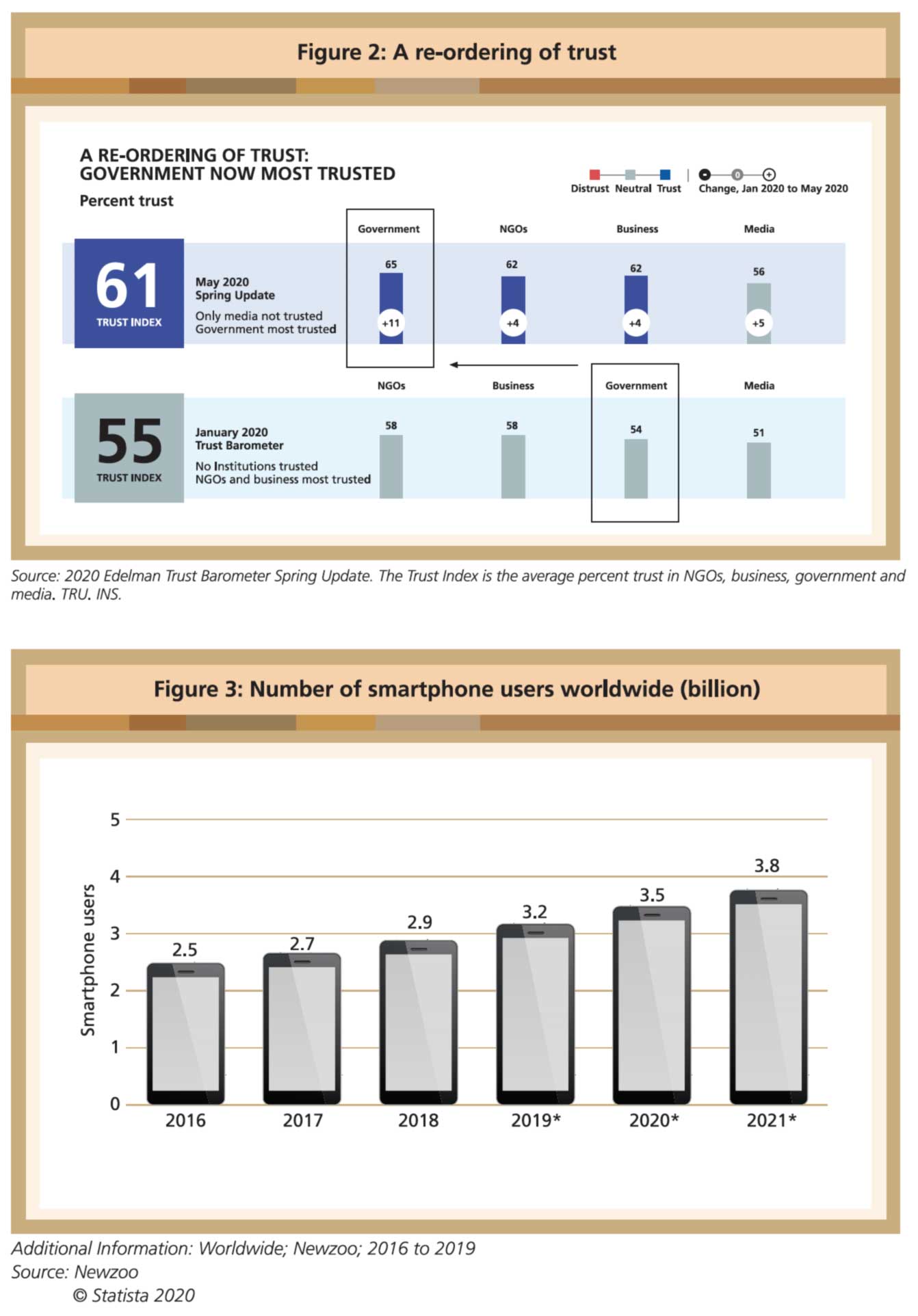 The use of smartphones is a factor behind ‘information’ going viral without verification or attribution to a credible source. According to Statisca, the number of smartphone users worldwide now surpasses three billion and is forecast to further grow by several hundred million over the next few years (Figure 3). China, India and the US are the countries with the highest number of smartphone users, with each country easily surpassing the 100 million user mark.
The use of smartphones is a factor behind ‘information’ going viral without verification or attribution to a credible source. According to Statisca, the number of smartphone users worldwide now surpasses three billion and is forecast to further grow by several hundred million over the next few years (Figure 3). China, India and the US are the countries with the highest number of smartphone users, with each country easily surpassing the 100 million user mark.
The use of smartphones has transformed the way that society receives information. There is convenience and immediate access to information via the Internet. On the flip side, this has led to users becoming lazy due to the mental shortcuts available.
A University of Waterloo study suggests that even smartphone users who are intuitive thinkers are more prone to relying on gut feeling and instinct when making decisions, frequently resorting to the search engine on smart devices rather than their own brainpower. ‘Ask Google’ is a common response when someone needs an immediate answer. The search engine provides the quick fix needed in a world where time is of the essence.
“Decades of research have revealed that humans are eager to avoid expending effort when problem-solving and it seems likely that people will increasingly use their smartphones as an extended mind, “noted Nathaniel Barr, a lead author of the paper, and a postdoctoral researcher at the University of Waterloo..
Nobel Prize winning economist Daniel Kahnemen has shown that the brain tends to seek solutions to problems that take the least mental effort, in reference to the reluctance to dig deep for answers.
Former chief executive of the Food Standards Agency Tim Smith, in an article for The Telegraph, called for an end to ‘alarmism’ in the food industry and for ‘cool heads’ to prevail. For instance, the alarmism around imports of chlorinated chicken and hormone-fed beef – both banned in the UK – do neither the industry nor the public any favours. He said there must be clear-eyed perspective on what is fair and works for consumers, farmers, food producers and animals.
Researchers Wim De Neys and his colleagues from the National Centre for Scientific Research in France asked 248 university students a simple question: ‘A bat and ball together cost US$1.10. The bat costs $1 more than the ball. How much does the ball cost?’
Most people would assume that the bat costs $1 and the ball costs 10 cents. But this is wrong. The correct answer is that the ball costs 5 cents and the bat costs $1.05. Highly intelligent people are more analytical and less intuitive when solving problems. They examine problems in a logical way.
The current concern over ‘lazy thinking’ can be applied to the dilemma that the palm oil industry faces due to disinformation. It has become the target of scaremongering due to poor knowledge resulting from lazy thinking.
This leaves consumers unable to distinguish between sound factual advice and unfounded claims. Many are left confused or form wrong perceptions, and blindly support calls for a boycott of products containing palm oil. Those who suffer the consequences are palm oil producers, including small farmers.
The best way to prevent lazy thinking is to repeat the facts so that people come away with a greater appreciation of the palm oil industry and the benefits for the planet. It is not an easy task, but when has anything difficult been easy to resolve?
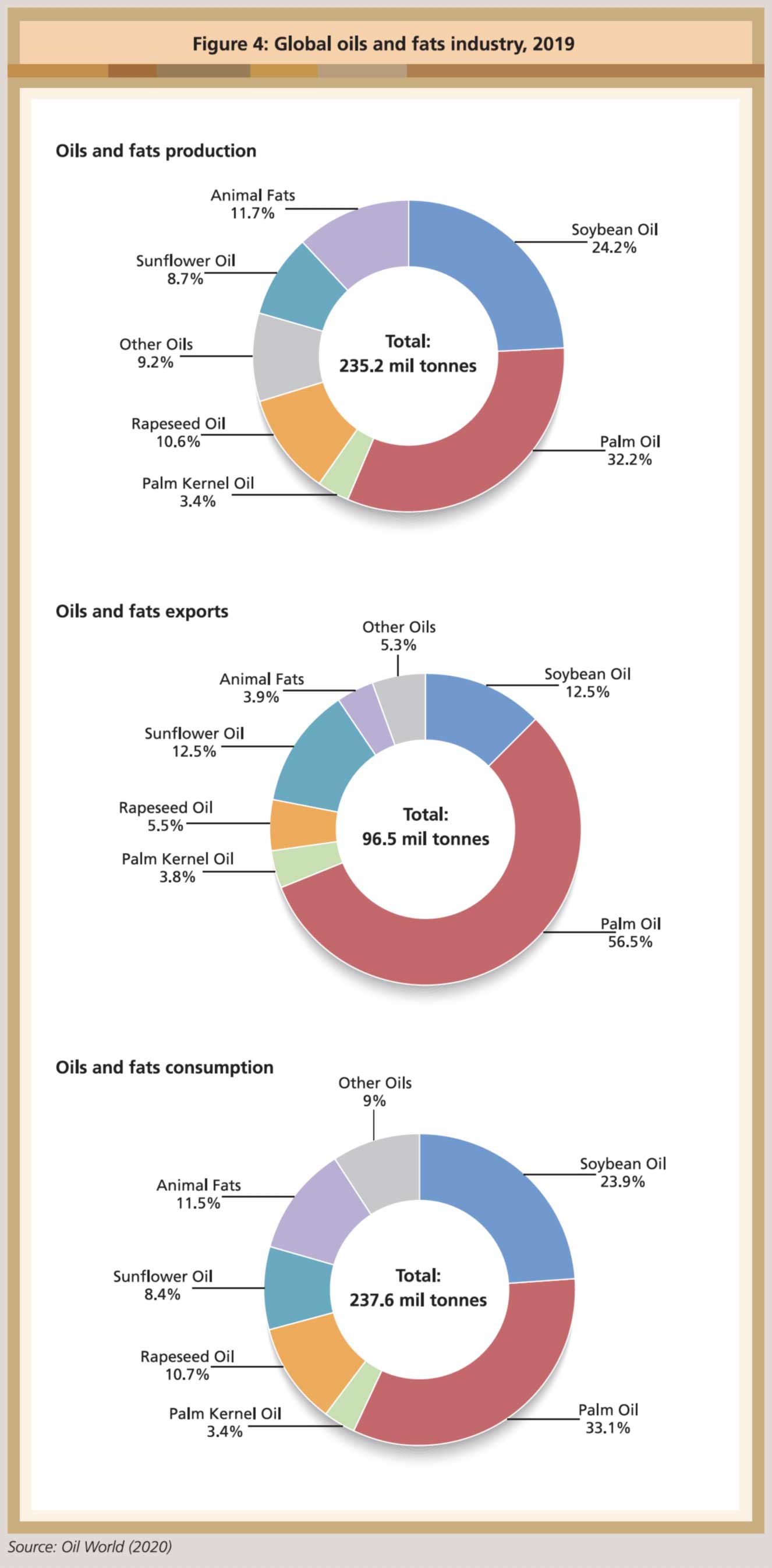 Oils and fats industry overview
Oils and fats industry overview
Oil palm has been grown in Malaysia for more than 100 years and remains a versatile commodity. Today, it dominates in terms of global production, trade and consumption of oils and fats; clearly, its widespread appeal is due to diverse applications across the food and nonfood sectors.
What accounts for this rapid growth and impressive size?
Individuals and businesses worldwide consume palm oil, so it is a commodity that has global appeal.
About 235.2 million tonnes of oils and fats were produced worldwide in 2019; palm oil contributed the highest percentage at 32.2%. It was the most traded commodity, with a 56.5% market- share. Of the 237.6 million tonnes of oils and fats consumed, palm oil accounted for 33.1% (Figure 4).
During my travels throughout Europe – where sunflower and rapeseed are the dominant vegetable oils – I could often tell that consumers and policy makers are still unaware of the importance of palm oil to other parts of the world, where rapid development is propelling the use of the commodity.
For example, Asia’s economic growth is projected to expand at a rate of 5% in 2019 and 5.1% in 2020. It will be the fastest-growing major region, accounting for more than two-thirds of global growth in 2019. According to the International Monetary Fund, China will account for 39% of global growth, with India at 16% and the Association of Southeast Nations at 10% (Figure 5).
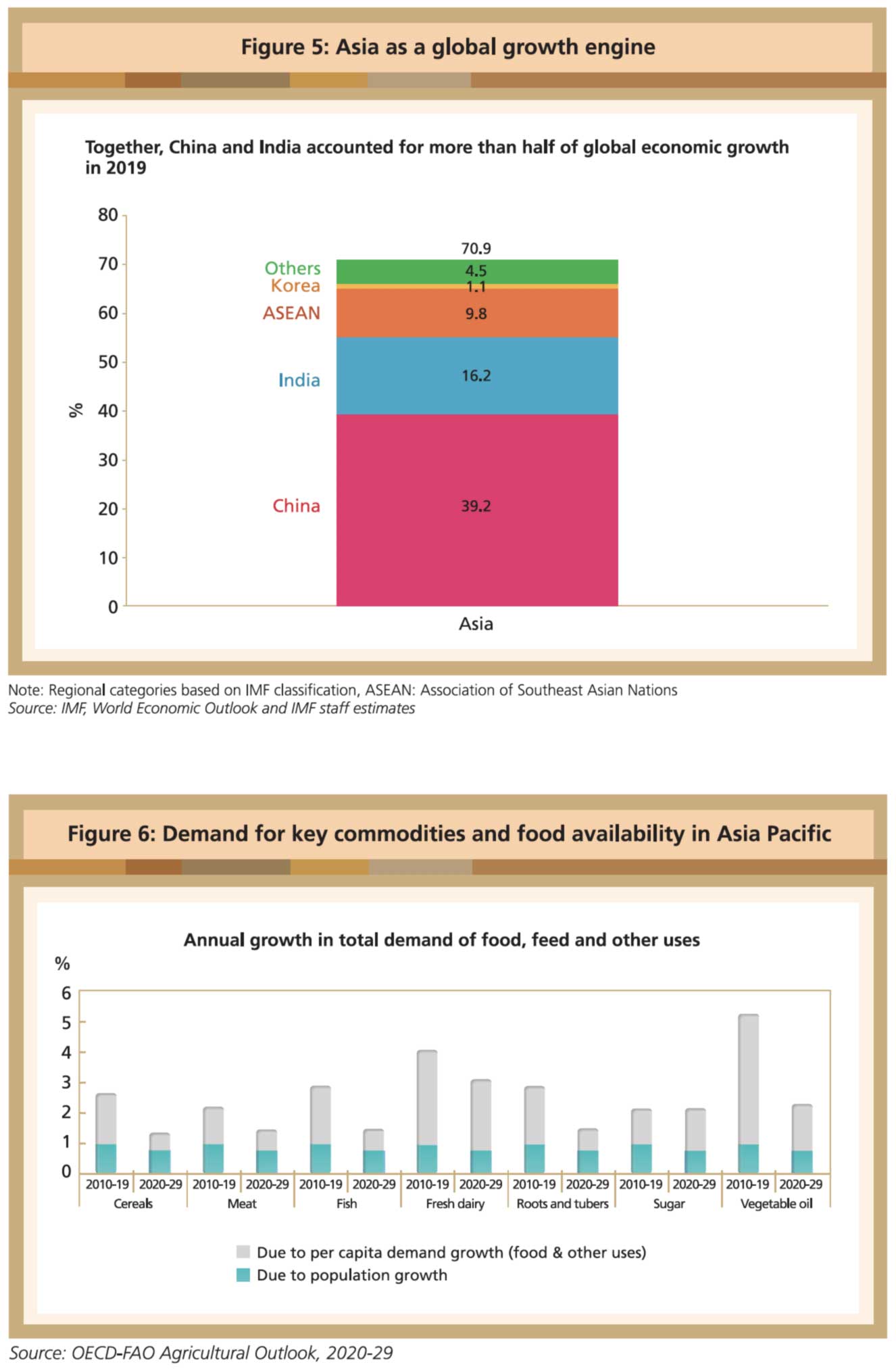 Population growth is another driver of food production. The global population is expected to increase by 11% or by 842 million people between 2017-19 and 2029. The OECD-FAO Agricultural Outlook 2020-29 states that the Asia- Pacific region will continue to shape the demand for food, being projected to account for 53% of the global population in 2029 (Figure 6). The region now contributes most to agricultural production – almost half of the global output. Europe and Central Asia and the Americas are responsible for 45%.
Population growth is another driver of food production. The global population is expected to increase by 11% or by 842 million people between 2017-19 and 2029. The OECD-FAO Agricultural Outlook 2020-29 states that the Asia- Pacific region will continue to shape the demand for food, being projected to account for 53% of the global population in 2029 (Figure 6). The region now contributes most to agricultural production – almost half of the global output. Europe and Central Asia and the Americas are responsible for 45%.
Amidst the expected rise in the global population, food insecurity remains a real worry. Poverty is the root cause of hunger and malnutrition in many parts of the world. An additional 17.2% of the world population, or 1.3 billion people, have experienced food insecurity at moderate levels, meaning they did not have regular access to nutritious and sufficient food. The combination of moderate and severe levels of food insecurity affects an estimated 26.4% or 2 billion people globally.
Advantages of palm oil
Palm oil is credited with lifting millions of people out of poverty in producer countries. Many people have gone from borderline starvation to realising economic well-being, better health and stable food security because of the palm oil industry.
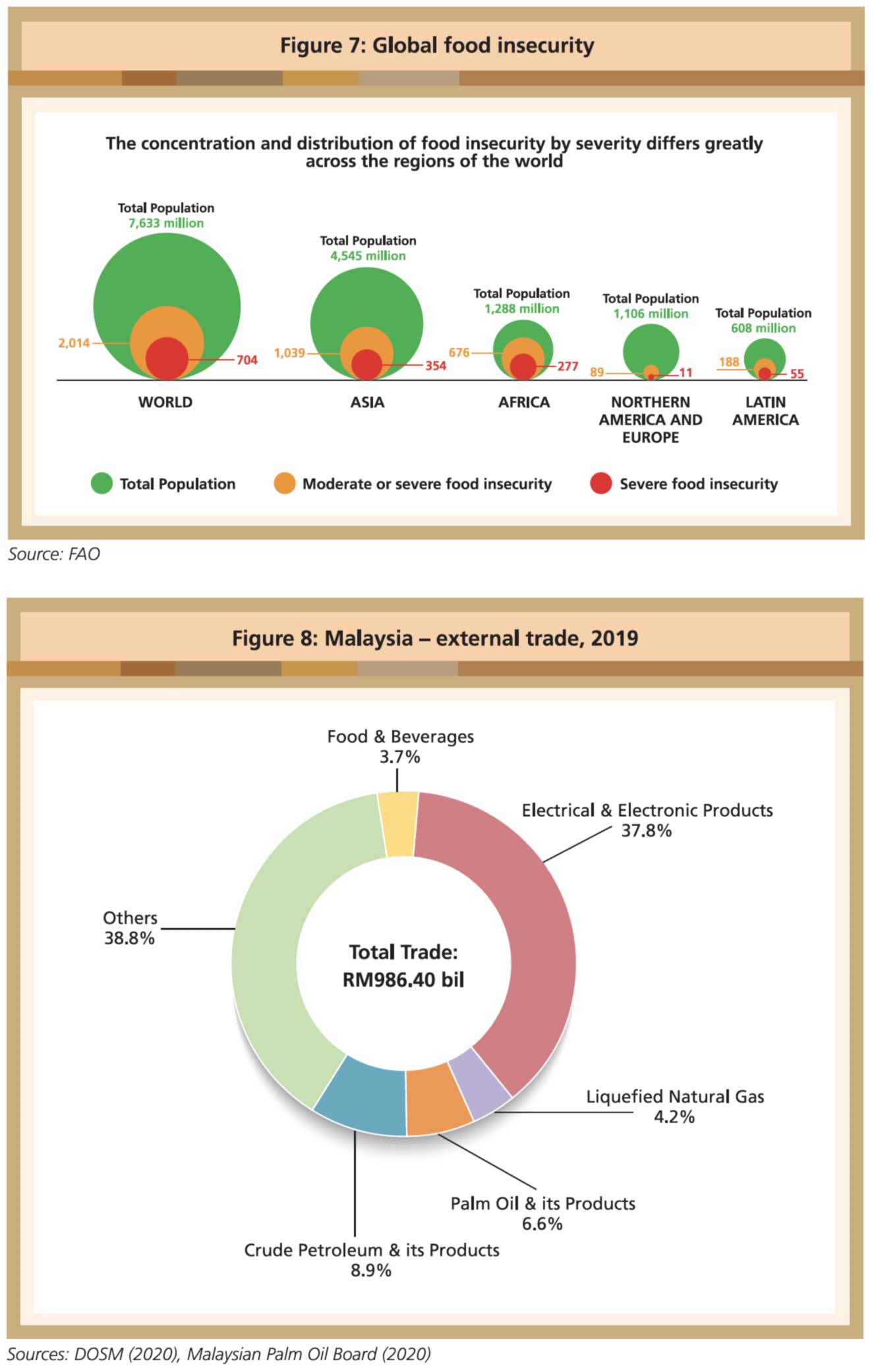 Malaysia’s success with its palm oil sector is a true story, supported by facts. The country is proud of what the industry has accomplished – billions of Ringgit in export earnings; jobs for almost three million people; the alleviation of poverty; and a higher standard of living for small farmers and their families. Palm oil is the third-largest contributor to the country’s external trade after electrical and electronic products, and crude petroleum and its products (Figure 8)
Malaysia’s success with its palm oil sector is a true story, supported by facts. The country is proud of what the industry has accomplished – billions of Ringgit in export earnings; jobs for almost three million people; the alleviation of poverty; and a higher standard of living for small farmers and their families. Palm oil is the third-largest contributor to the country’s external trade after electrical and electronic products, and crude petroleum and its products (Figure 8)
The oil palm is the world’s most efficient oil-bearing crop in terms of land utilisation, efficiency and productivity. A single hectare can produce up to eight times more oil than other oilseeds (Figure 9). The oil palm uses significantly less land per hectare than competing oilseed crops, including sunflower, canola and rapeseed. The oil palm yields 4-10 times more oil per hectare of land, and requires far less pesticide and fertilizer compared to rapeseed and soybean.
No competing oil comes close to the oil palm’s yield or sustainability. A high yield is what would feed the greatest number of hungry people on the smallest ecological footprint. That is why the oil palm industry has focused on yield improvement rather than land expansion.
Given this, a report by the International Union for the Conservation of Nature has concluded that boycotting palm oil would merely shift demand to other oils. This could worsen environmental problems because more land would be required for replacement oils to meet global demand.
With only 0.4% of the world’s population, Malaysia produced 9.4% of the global vegetable oils and fats output and accounted for 20.2% of the export trade in oils and fats in 2019. All this has come from a small area of 1.8% of the 291 million ha under the world’s 10 major harvested oilseed area (Figure 10).
Despite the undisputed facts, the industry is often mis-characterised by policy makers and NGOs who seek to serve their own agenda. But it is necessary for the industry to continue sharing the facts and a perspective that many probably don’t often hear or don’t want to hear.
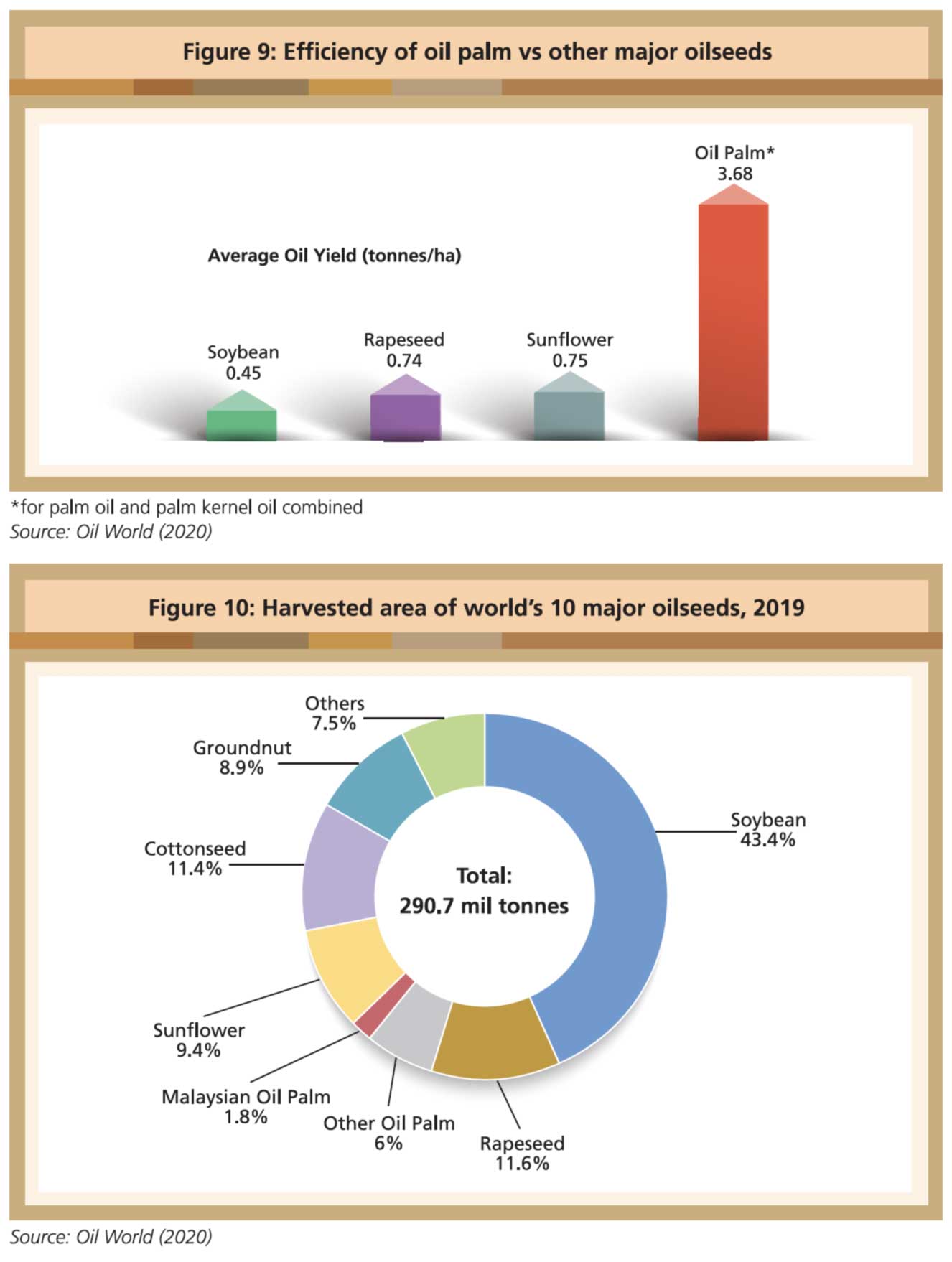
We need to find ways to make our voice better heard – it’s not always about being loud, but about being consistent and persistent, and to repeat the facts. What can the industry do?
- We could assemble the best minds to help formulate advice and recommendations to correct misinformation. This will be challenging as there will be many differing views; so, for a start, it would be useful if a consensus is reached.
- It is essential to ensure the facts are based on evidence. Consumers must have the right information to make better decisions and to avoid becoming confused. A fact checker could be established where information can be easily verified. A successful response to misinformation would require a coordinated multi-stakeholder effort.
- The industry should speak with a single voice to relay clear messages and without adding to information overload. Consumers are already exposed to thousands of different messages that compete for their attention. Merely stating scientific facts is not going to attract their attention. It would be more effective to speak in ordinary, easily understood terms.
- There is a need to work from reality. Many in the West can’t distinguish between the oil palm (the tree) and palm oil (the oil). Many have never seen an oil palm tree or used palm oil directly. After all, the crop is not grown in their country – they are more familiar with sunflower, rapeseed, soybean or the olive.
I’ve never forgotten a situation years ago in Australia, when we were called before the Senate to respond to issues affecting palm oil under the Truth in Labelling Bill. I had expected the learned Senators to have done their homework prior to asking us questions, as they were considering legislation that would affect the livelihood of oil palm famers in Malaysia.
I was surprised when we were asked to send photographs of an oil palm tree as they had not seen one before. They could not figure out how the fruit is harvested and how the oil is produced. It was a frustrating time for us, but it provided a reality check about the ignorance that exists.
- Be prepared for the possibility that new elements of disinformation will be circulated. This is common with campaigns that need to keep followers in tune with so-called new information.
Lazy thinking is unlikely to end any time soon. But a key role for the palm oil industry is to protect the good name of the commodity. No one can do this better for us than ourselves.
Belvinder Sron
Deputy CEO, MPOC











Leave a Reply